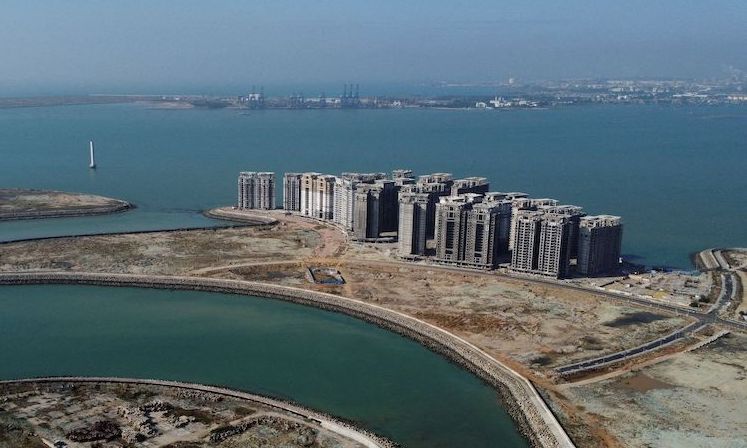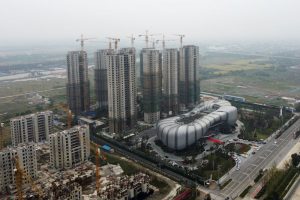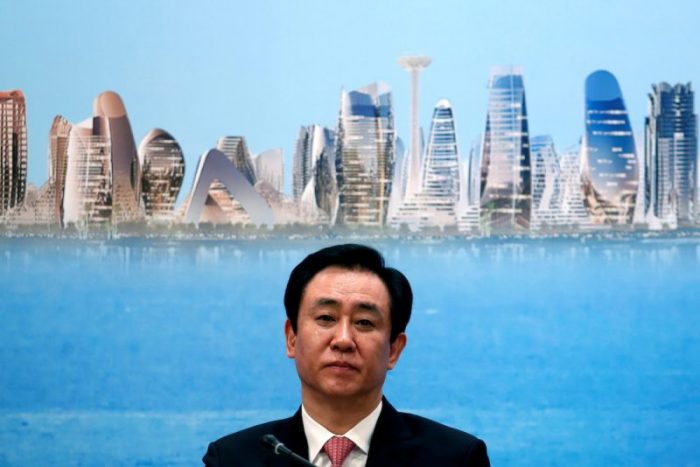China Evergrande – the poster child of China’s ludicrous real estate frenzy – is set to crash and burn. But the tangled wreckage of its $300-billion collapse could take a decade to extinguish.
Evergrande Group faces delisting from the Hong Kong Stock Exchange on Monday, an outcome the Communist Party leaders are likely happy to see, given the dark shadow it has cast on their closed and woefully unbalanced system.
Evergrande was once the country’s premier developer. Its IPO in Hong Kong in 2009 was the biggest by a Chinese private developer, yet it ended with the largest pile of debt in the global property sector.
ALSO SEE: China Court Says Firms Must Pay Workers’ Pension; Job Crisis Fear
That attribute stayed with the company till the very end of its boom-to-bust saga – its delisting will be one of the largest by market value and volume in recent years.
For investors in the firm, the journey has been anything but grand.

Unbridled debt-fuelled expansion
The developer started with a strong public market debut and a stock value of $9 billion in late 2009 that grew more than five-fold to $51 billion eight years later, only to plummet to earth in recent years. It is now worth a meagre $282 million.
The company’s journey from stock exchange darling to a pariah in the financial markets is a cautionary tale of unbridled debt-fuelled expansion in the world’s second-largest economy.
Its shares fetched HK$31.39 apiece at its peak, and it was down to HK$0.163 when it exchanged hands for the last time 19 months ago.
Trading in shares in the world’s most indebted developer with more than $300 billion in liabilities has been suspended since it was hit with a liquidation order on January 29, 2024, after it defaulted on debt and failed to finalise a restructuring plan.
Evergrande is getting delisted from the Hong Kong Stock Exchange due to its failure to resume trading within 18 months, according to a filing on August 12.
Property crisis in its fifth year
The delisting will close a chapter in China’s unprecedented property crisis that started in 2021, though it’s unlikely to be the last to meet such a fate as the sector continues to be hobbled by a liquidity squeeze and a lack of demand.
Earlier this month, China South City became the first state-backed property developer to get a liquidation order from the Hong Kong High Court, following a similar fate for a handful of privately-owned peers.
“Evergrande is one of the landmark examples of the collapse of China’s real estate sector a few years ago,” Gary Ng, senior economist at investment bank Natixis, said.
While the delisting is “largely symbolic”, he said it “still marks the end of the golden age of China’s real estate sector.”
Chinese authorities over the last few years have been striving to revive the property sector that once accounted for a quarter of its GDP, while buyers wait for their unfinished homes to be handed over and creditors hope to recoup their money.
“It’ll be hard to revive consumption demand and sentiment when people have an empty pocket,” said Oscar Choi, chief investment officer of Hong Kong-based Oscar and Partners Capital Ltd, who covered Evergrande as an equity analyst for many years previously at an investment bank.
Evergrande declined to comment.

Developers scrambling to stay afloat
The delisting of Evergrande comes as many other developers scramble to stay afloat and avoid getting into liquidation by securing creditors’ support to revamp debt, analysts have said.
Evergrande’s rapid rise to the top, followed by its dramatic collapse, mirrors the fate of its founder, who was raised by his grandmother in a rural village in central Henan province, started as a steel technician and became one of China’s richest.
At Evergrande’s listing party in 2009 filled with champagne, Hui Ka Yan was joined by many Hong Kong tycoons including Hong Kong property giant New World Development’s late founder Cheng Yu-tung and Chinese Estates founder Joseph Lau.
In March last year, Hui was barred from the securities market for life and fined 47 million yuan after the regulator accused the group’s flagship unit of inflating results, securities fraud and failing to make timely disclosures.
While Hui has not been seen in public since his arrest in 2023, the company liquidators are fighting court battles with him to freeze his and his former spouse’s overseas assets and to recover $6 billion paid in dividends and remuneration to him and other former executives.
Lawyers expect the liquidation process to take a decade and the recovery rate for creditors is likely to be very low.
Evergrande’s liquidators said last week they have recovered about $255 million from selling the firm’s offshore assets, which included school bonds, club memberships, artwork and motor vehicles.
That compares to creditor claims made to liquidators totalling $45 billion.
Hopes for some homebuyers and investors who put their money in Evergrande’s wealth management products are also diminishing.
“After a lot of property viewings, I chose Evergrande because I thought such a big developer would not collapse. I was wrong,” Douyin user 8AD2D1D4, who was waiting to receive his home purchase, wrote in the social media post.
And he is likely one of many thousands.
- Reuters with additional input and editing by Jim Pollard
























